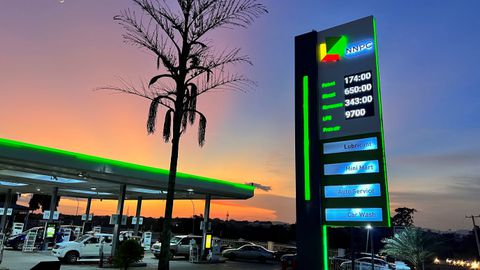
Michael Eboh
Dublin, Ireland — Despite accusations and concerns of opacity in its operations and finances, the Nigerian National Petroleum Corporation Limited (NNPCL) has shown no interest in allaying these concerns, as 96.81 per cent of its export earnings were from countries notorious for offshore secrecy and considered as tax havens.
According to data from its audited financial statement for 2023, N2.6 trillion of its export earnings from crude oil, gas and petroleum products sales were from Panama, Cayman Island and Bahamas.
Specifically, of the total NNPCL’s revenue of N23.99 trillion, N21.304 trillion was from within the country, while N2.69 trillion were from offshore transactions from the United Kingdom, Panama, Cyprus, Bahamas, Dubai and Cayman Island.
According to the financials, while revenue from the United Kingdom came to N2.002 billion, being receipt for services, earnings from Cyprus and Dubai stood at N80.499 billion and N3.154 billion, respectively, with both being receipts for services.
However, the NNPCL recorded revenue of N2.046 trillion for crude oil sales from Panama; revenue of N402.763 billion for natural gas sales from Cayman Island, while N151.789 billion was earned from the Bahamas for petroleum products sales.
Ironically, Panama, Cayman Island and Bahamas do not feature among Nigeria’s top export destinations for crude oil sales or foreign trade in the quarterly foreign trade reports released by Nigeria’s statistical agency, the National Bureau of Statistics (NBS).
Panama, the Bahamas, and the Cayman Islands are increasingly becoming attractive to businesses and individuals, as they are often considered tax havens, offering favourable tax conditions, such as low-or-zero income tax, corporate tax, or capital gains tax.
Specifically, while Panama is renowned for its strict banking secrecy laws and favourable tax policies, allowing foreign and offshore companies to operate without paying local taxes on income earned outside the country, Bahamas has no income tax, corporate tax, capital gains tax, or inheritance tax, making it a popular destination for offshore banking and company incorporation.
In addition, the Cayman Islands is one of the largest offshore financial centers in the world, and does not impose direct taxes on income, profits, or capital gains. It also has stringent privacy laws to protect financial information.
These countries are attractive destinations because of the financial privacy and minimal tax obligations they offer, but they have also faced criticism and scrutiny for potentially facilitating tax avoidance and other illicit financial activities.
Nigeria, despite the worsening opacity in the NNPCL, is a signatory to the Extractive Industries Transparency Initiative (EITI) principles, which saw Nigeria setting up the Nigeria Extractive Industry Transparency Initiative (NEITI), which have over the years, undertaken the audit of the Nigeria oil and gas and mining industries.
The aim of the EITI is to promote transparency and accountability in the extractive sector, which includes oil, gas, and mining industries, by ensuring transparency in payments by oil firms; beneficial ownership disclosure and compelling oil and extractive firms to make their financial data publicly available.
The EITI principles are useful in ensuring that revenues from natural resources are used for public benefit rather than being hidden in offshore accounts; in combating the use of anonymous shell companies often found in tax havens; and to hold companies accountable, thereby reducing the opportunities for tax evasion and profit shifting to low-tax jurisdictions.
This article was originally posted at sweetcrudereports.com
Be the first to comment